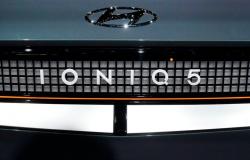In April, Ecuador suffered scheduled power outages of up to 13 hours due to prolonged drought.
AFP
Ecuador suffered a “nationwide” blackout on Wednesday afternoon due to network failure that caused scenes of “chaos”, with the government blaming past lack of investment in dilapidated facilities.
The blackout began at 3:17 p.m. (10:17 p.m. in Switzerland) and electricity gradually returned to be “restored to 95% (3,500 MW)” nationally three hours later, said the Minister of Energy. , Roberto Luque.
The metro was paralyzed, requiring the evacuation of thousands of passengers, sometimes on the tracks but apparently calmly, according to videos broadcast by media.
“There is a failure in the network which has caused cascading disconnections, so there is no electricity throughout the country,” he first announced in the afternoon on the social network “We are focusing all our efforts to resolve the problem as quickly as possible,” he added.
“Blackout on the system”
Three hours later, at 6:41 p.m. local time (1:41 a.m. in Switzerland on Thursday), electricity was “restored to 95% (3,500 MW)” at the national level, the minister said, with supporting graphics. It was “a failure of the Milagro Zhoray transmission line (which) caused a +blackout+ on the national system,” he said. “For years there has been a lack of investment in these electrical systems and networks, and today we are suffering the consequences,” explained the minister.
The cut surprised Ecuadorians, particularly residents of the capital Quito and users of its metro. Power returned gradually, from one neighborhood to another, an hour after the blackout, at least in Quito, a city of some three million inhabitants, AFP noted.
“The national shutdown affected the WHOLE capital,” commented its mayor on X, Pabel Muñoz. “The incident must be very important for it to have affected even the energy of the Quito metro, which uses an autonomous system,” he was alarmed, saying he had ordered “the activation of all the teams of reaction of the Municipality of Quito to facilitate mobility, prevent accidents at main intersections and manage public spaces.
Municipal officers were urgently deployed to road junctions, in the midst of chaos while traffic lights were out of service. The local press also spoke of “road chaos” at congested intersections.
The same road chaos was observed in the large port city of Guayaquil, on the Pacific coast, according to an AFP correspondent, reporting many people stuck in broken elevators in large office and residential buildings.
Still in Guayaquil, the company in charge of drinking water management called on the population to “take measures and stock up” on water, while waiting for a return to normal.
The tram in the southern city of Cuenca also stopped operating. In Quito, the internet was also temporarily cut, AFP noted, and the cell phone network intermittently disrupted, according to the press.
“Energy crisis”
“Due to the national power outage and in order to ensure the safety of the educational community, classes are suspended in all educational establishments” public and private, announced the Ministry of Education.
Minister Roberto Luque did not specify exactly the extent of the breakdown, or the possible victims that the incident could have caused. “This event is a REAL reflection of the energy crisis we are experiencing, with the lack of investment in production (what happened in April), the lack of investment in transmission (what happened today) and in distribution,” he simply commented after the outage.
In April, Ecuador suffered planned power outages of up to 13 hours due to a prolonged drought, hydroelectric reservoirs at their minimum, and dilapidated infrastructure, according to authorities. The cuts stopped in May with the return of the rains.
The country has also been plunged since January into a serious security crisis, confronted with the violence of drug trafficking and criminal gangs to which President Daniel Noboa, elected at the end of 2023 for 18 months, has declared “war”.
(AFP)






